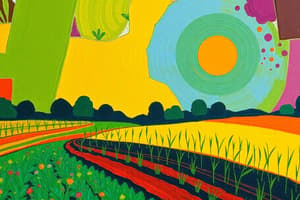Podcast
Questions and Answers
What is the primary purpose of subsistence farming?
What is the primary purpose of subsistence farming?
- To raise livestock on large areas of rangeland
- To grow crops and raise livestock for personal consumption (correct)
- To produce crops and livestock for sale in the market
- To produce crops and livestock on a large scale
What type of farming involves large areas of land and low inputs of labor and capital?
What type of farming involves large areas of land and low inputs of labor and capital?
- Commercial farming
- Intensive farming
- Extensive farming (correct)
- Mixed farming
Which type of farming involves raising both crops and livestock on the same farm?
Which type of farming involves raising both crops and livestock on the same farm?
- Pastoralism
- Mixed farming (correct)
- Commercial farming
- Subsistence farming
What is the primary characteristic of commercial farming?
What is the primary characteristic of commercial farming?
Which type of farming involves raising livestock on large areas of rangeland?
Which type of farming involves raising livestock on large areas of rangeland?
Flashcards
Subsistence Farming Purpose
Subsistence Farming Purpose
Producing crops and livestock for personal use.
Extensive Farming Feature
Extensive Farming Feature
Large land area, low labor and capital use.
Mixed Farming Description
Mixed Farming Description
Raising crops and animals together.
Commercial Farming Goal
Commercial Farming Goal
Producing food for market sale.
Signup and view all the flashcards
Pastoralism Focus
Pastoralism Focus
Raising animals on large open lands.
Signup and view all the flashcardsStudy Notes
Types of Farming
- Farming can be classified into various types based on crop and livestock production, geographical conditions, and cultural practices.
Subsistence Farming
- Farmers grow crops and raise livestock primarily for their own consumption.
- Main goal is to provide food for the farmer's family and community.
Commercial Farming
- Farmers produce crops and livestock for sale in the market.
- Main goal is to generate profit through selling products.
Extensive and Intensive Farming
- Extensive farming: involves large areas of land and low inputs of labor and capital.
- Intensive farming: involves smaller areas of land and high inputs of labor and capital.
- Key difference is the amount of land and resources used.
Mixed Farming
- Farmers raise both crops and livestock on the same farm.
- Diversifies farm products and income streams.
Pastoralism
- Farmers raise livestock on large areas of rangeland.
- Focuses on grazing and breeding of livestock, often on open ranges.
Studying That Suits You
Use AI to generate personalized quizzes and flashcards to suit your learning preferences.




